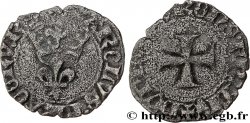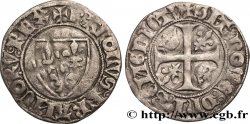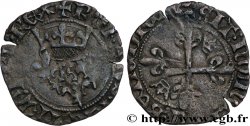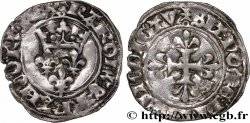Obverse
Obverse legend : + AGN’: DEI: QVI TOLL’: PECA: MVDI: MISE: NOBIS, (M ET N ONCIALES, PONCTUATION PAR DEUX ANNELETS SUPERPOSÉS).
Obverse description : Agneau pascal à gauche, une des pattes antérieures relevée, la tête tournée à droite et nimbée, devant une croix tréflée avec un gonfanon qui coupe la légende à l'exergue et repose sur un groupe de trois points, le tout dans un polylobe bouleté interrompu en bas par K: F-RX.
Obverse translation : (Charles, roi des Francs ; agneau de Dieu qui enlève les péchés du monde, prends pitié de nous).
Reverse
Reverse legend : + XPC* VINCIT* XPC* REGNAT* XPC* INPERAT, (N ROMAINES ET RÉTROGRADES, PONCTUATION PAR UNE ROSE À CINQ PÉTALES).
Reverse description : Croix trifoliée avec une rose à cinq pétales dans un quadrilobe anglé en cœur, cantonnée de quatre lis, le tout dans un quadrilobe anglé cantonné de sept petits lis et d'un groupe de trois points posés en triangle.
Reverse translation : (Le Christ vainc, le Christ règne, le Christ commande).
Commentary
Historical background
CHARLES VI LE FOU ou LE BIEN AIMÉ / THE BELOVED or THE MAD
(09/16/1380-10/21/1422)
Born in Paris in 1368, Charles VI was the son of Charles V and Jeanne de Bourbon. In 1380, Louis d'Anjou exercised the regency, Burgundy and Berry the guardianship of the royal children. Charles V's advisers were kept in power. But Louis had his expedition to Italy financed by the royal coffers to recover the succession of the Angevins of Naples. An era of unrest began: great schism in the West from 1378, urban revolts in Languedoc, Italy, England and Germany, soon in Flanders, Paris and Rouen. From 1383, the royal power regained the upper hand and the repression was terrible. In January 1383, the provostship of merchants was united with the provostship of Paris and the jurisdictions of trades dissolved. In 1382-1384, Jean de Berry restored order in Languedoc. In January 1384, Philippe le Hardi, Duke of Burgundy, became Count of Flanders on the death of his father-in-law Louis de Male and in 1385 married the young king to Isabeau of Bavaria.. In 1388, Charles VI dismissed his uncles and recalled his father's advisers (Bureau de La Rivière, Jean Le Mercier, Jean de Montagu), the "Marmousets" and put Louis II of Anjou or Orléans at the head of the council. , son of Louis I, died in 1384, who took the title of King of Jerusalem and Sicily. In August 1392, during an expedition against Brittany, Charles VI went mad. The Marmosets were expelled from the Council. Louis of Anjou and the king's uncles, Berry and Bourgogne, seized power. Philip the Bold makes peace with England and marries Richard II to Isabella of France. But, in 1399, the Duke of Derby became King of England under the name of Henry IV: everything had to be started again.. Philip the Bold, who died in 1404, was succeeded by his son John the Fearless, hero of the Nicopolis Crusade, who soon came up against Louis of Orleans.. On November 23, 1407, the Duke of Orleans was assassinated on leaving the Hôtel Barbette. His son Charles allied himself with the great feudal lords of the South, the Constable Charles d'Albret and Count Bernard VIII of Armagnac, forming the so-called "Armagnacs" party.. In 1412, the Duke of Burgundy, who had rallied the Parisians through demagogic measures, entered the capital. Since 1411, the Burgundians had been allied with the English, who landed in Cotentin in 1412. In 1413, the Estates General met in Paris, under the control of the Burgundian party, to prepare an ordinance of reform. A Parisian riot, of the so-called "Cabochiens" party, stopped the process. In August, the Duke of Burgundy left Paris and the Duke of Orleans returned there.. However, Henry V, King of England since 1413, landed at the mouth of the Seine. In October 1415, he decided to reach Calais. The army of Charles VI blocked his way. The battle took place at Agincourt on October 25, 1415. The French chivalry was cut to pieces; the Dukes of Orleans and Bourbon fell into the hands of Henry V. In 1417, the French fleet was destroyed at La Hougue, in 1418 Henri V seized Normandy. On May 29, 1418, Paris fell back to the power of the Burgundians.. The dolphin Louis barely escaped. On September 10, 1419, a reconciliation meeting took place between Jean sans Peur and the Dauphin; the Duke of Burgundy was stabbed there. The Burgundian party now turned definitively to England. After negotiations between Franco-Bourguignons and English, in Arras, the peace treaty was sealed in Troyes on May 21, 1420: Henry V married the daughter of Charles VI and Isabeau of Bavaria, became regent of the kingdom and the dolphin Charles was deprived of his rights. In August 1422, Henri V died in Vincennes, Charles VI followed him to the grave the following October. The Duke of Bedford became regent of France and England for the young King Henry VI, while the dauphin, who had taken refuge in Bourges, proclaimed himself king under the name of Charles VII..








 Report a mistake
Report a mistake Print the page
Print the page Share my selection
Share my selection Ask a question
Ask a question Consign / sell
Consign / sell
 Full data
Full data









